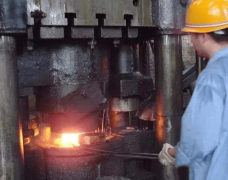Matters Needing Attention in Forging Process
Matters Needing Attention in Forging Process
Aug 19, 2020
(1) Forging process includes: cutting materials into required sizes, heating, forging, heat treatment, cleaning and inspection. In small-scale manual forging, all these operations are carried out in a narrow place by several forgers. They are all exposed to the same harmful environment and occupational hazards; in large forging workshops, hazards vary with different jobs. Although the working conditions vary with forging forms, they have some common characteristics: moderate-intensity manual labor, dry and hot microclimate environment, noise and vibration, and air pollution by smoke.
 (2) Workers are exposed to high temperature air and heat radiation at the same time, which leads to the accumulation of heat in the body. Heat combined with metabolic heat will cause heat dissipation imbalance and pathological changes. The perspiration amount of 8-hour labor will vary with the gas environment, physical exertion and thermal adaptability, generally ranging from 1.5 to 5 liters, or even higher. In a small forging workshop or far away from the heat source, the Berhardt's heat stress index is usually 55 ~ 95; however, in a large forging workshop, the working point near the heating furnace or the drop hammer machine may be as high as 150~190. It is easy to cause salt deficiency and heat spasm. In the cold season, exposure to changes in microclimate environment may promote its adaptability to a certain extent, but rapid and too frequent changes may pose health hazards.
(2) Workers are exposed to high temperature air and heat radiation at the same time, which leads to the accumulation of heat in the body. Heat combined with metabolic heat will cause heat dissipation imbalance and pathological changes. The perspiration amount of 8-hour labor will vary with the gas environment, physical exertion and thermal adaptability, generally ranging from 1.5 to 5 liters, or even higher. In a small forging workshop or far away from the heat source, the Berhardt's heat stress index is usually 55 ~ 95; however, in a large forging workshop, the working point near the heating furnace or the drop hammer machine may be as high as 150~190. It is easy to cause salt deficiency and heat spasm. In the cold season, exposure to changes in microclimate environment may promote its adaptability to a certain extent, but rapid and too frequent changes may pose health hazards.
Air pollution:
The air in workplace may contain soot, carbon monoxide, carbon dioxide, sulfur dioxide, or acrolein, whose concentration depends on the type and impurities of heating furnace fuel, combustion efficiency, air flow and ventilation conditions.
Noise and vibration:
The forging hammer will inevitably produce low-frequency noise and vibration, but it may also have certain high-frequency components. Its sound pressure level is between 95 and 115 decibels. Workers exposed to forging vibration may cause temperament and functional imbalance, which will reduce working ability and affect safety.
 (2) Workers are exposed to high temperature air and heat radiation at the same time, which leads to the accumulation of heat in the body. Heat combined with metabolic heat will cause heat dissipation imbalance and pathological changes. The perspiration amount of 8-hour labor will vary with the gas environment, physical exertion and thermal adaptability, generally ranging from 1.5 to 5 liters, or even higher. In a small forging workshop or far away from the heat source, the Berhardt's heat stress index is usually 55 ~ 95; however, in a large forging workshop, the working point near the heating furnace or the drop hammer machine may be as high as 150~190. It is easy to cause salt deficiency and heat spasm. In the cold season, exposure to changes in microclimate environment may promote its adaptability to a certain extent, but rapid and too frequent changes may pose health hazards.
(2) Workers are exposed to high temperature air and heat radiation at the same time, which leads to the accumulation of heat in the body. Heat combined with metabolic heat will cause heat dissipation imbalance and pathological changes. The perspiration amount of 8-hour labor will vary with the gas environment, physical exertion and thermal adaptability, generally ranging from 1.5 to 5 liters, or even higher. In a small forging workshop or far away from the heat source, the Berhardt's heat stress index is usually 55 ~ 95; however, in a large forging workshop, the working point near the heating furnace or the drop hammer machine may be as high as 150~190. It is easy to cause salt deficiency and heat spasm. In the cold season, exposure to changes in microclimate environment may promote its adaptability to a certain extent, but rapid and too frequent changes may pose health hazards.Air pollution:
The air in workplace may contain soot, carbon monoxide, carbon dioxide, sulfur dioxide, or acrolein, whose concentration depends on the type and impurities of heating furnace fuel, combustion efficiency, air flow and ventilation conditions.
Noise and vibration:
The forging hammer will inevitably produce low-frequency noise and vibration, but it may also have certain high-frequency components. Its sound pressure level is between 95 and 115 decibels. Workers exposed to forging vibration may cause temperament and functional imbalance, which will reduce working ability and affect safety.
Next: Risky Factors and Main Reasons of Forging Production
Previous: Production Technology of Forged Valve
News
About Us
Best Categories
Useful Links
